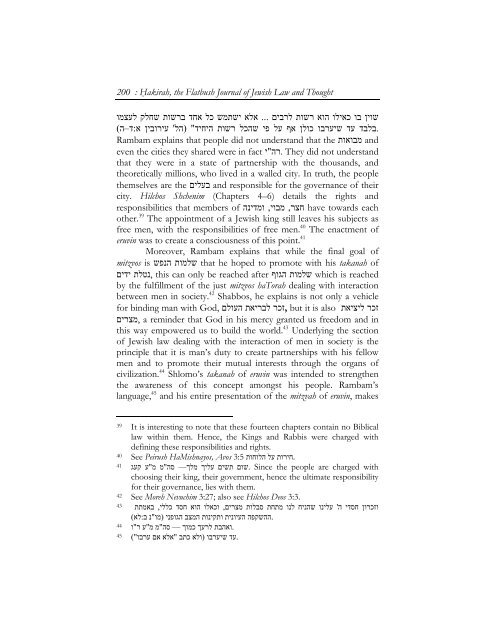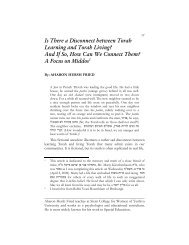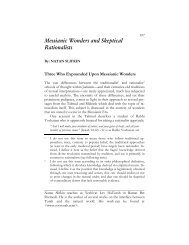King Solomon's Takanah: Rambam's Eruv - Hakirah.org
King Solomon's Takanah: Rambam's Eruv - Hakirah.org
King Solomon's Takanah: Rambam's Eruv - Hakirah.org
You also want an ePaper? Increase the reach of your titles
YUMPU automatically turns print PDFs into web optimized ePapers that Google loves.
200 : Hạkirah, the Flatbush Journal of Jewish Law and Thought<br />
...<br />
( .<br />
Rambam explains that people did not understand that the מבואות and<br />
even the cities they shared were in fact "י .רה They did not understand<br />
that they were in a state of partnership with the thousands, and<br />
theoretically millions, who lived in a walled city. In truth, the people<br />
themselves are the בעלים and responsible for the governance of their<br />
city. Hilchos Shchenim (Chapters 4–6) details the rights and<br />
שוין בו כאילו הוא רשות לרבים אלא ישתמש כל אחד ברשות שחלק לעצמו<br />
בלבד עד שיערבו כולן אף על פי שהכל רשות היחיד" (הל' עירובין א:ד–ה<br />
responsibilities that members of מבוי, , have towards each<br />
other. 39 The appointment of a Jewish king still leaves his subjects as<br />
free men, with the responsibilities of free men. 40 The enactment of<br />
eruvin was to create a consciousness of this point. 41<br />
Moreover, Rambam explains that while the final goal of<br />
mitzvos is שלמות הנפש that he hoped to promote with his takanah of<br />
חצר<br />
ומדינה<br />
, this can only be reached after שלמות הגוף which is reached<br />
by the fulfillment of the just mitzvos haTorah dealing with interaction<br />
between men in society. 42 Shabbos, he explains is not only a vehicle<br />
זכר ליציאת but it is also ,זכר לבריאת העולם God, for binding man with<br />
a reminder that God in his mercy granted us freedom and in ,מצרים<br />
this way empowered us to build the world. 43 Underlying the section<br />
of Jewish law dealing with the interaction of men in society is the<br />
principle that it is man’s duty to create partnerships with his fellow<br />
men and to promote their mutual interests through the <strong>org</strong>ans of<br />
civilization. 44 Shlomo’s takanah of eruvin was intended to strengthen<br />
the awareness of this concept amongst his people. Rambam’s<br />
language, 45 and his entire presentation of the mitzvah of eruvin, makes<br />
נטלת ידים<br />
39 It is interesting to note that these fourteen chapters contain no Biblical<br />
law within them. Hence, the <strong>King</strong>s and Rabbis were charged with<br />
defining these responsibilities and rights.<br />
.חירות על הלוחות 40 See Peirush HaMishnayos, Avos 3:5<br />
—<br />
. Since the people are charged with<br />
choosing their king, their government, hence the ultimate responsibility<br />
for their governance, lies with them.<br />
42 See Moreh Nevuchim 3:27; also see Hilchos Deos 3:3.<br />
'<br />
( .<br />
— "ו<br />
.<br />
(" .<br />
שום תשים עליך מלך סה"מ מ" ע קעג 41<br />
וזכרון חסדי ה עלינו שהניח לנו מתחת סבלות מצרים, וכאלו הוא חסד כללי, באמתת 43<br />
ההשקפה העיונית ותקינות המצב הגופני (מו"נ ב:לא<br />
ואהבת לרעך כמוך סה"מ מ"ע ר 44<br />
עד שיערבו (ולא כתב "אלא אם ערבו 45
















